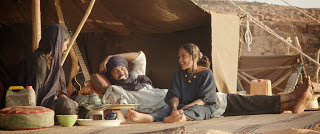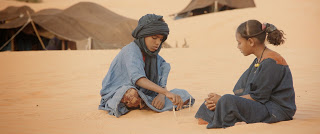‘Timbuktu’ explores the challenges of managing our personal power
“Timbuktu” (2014). Cast: Ibrahim Ahmed, Toulou Kiki, Layla Walet Mohamed, Abel Jafri, Mehdi A.G. Mohamed, Kettly Noël, Adel Mahmoud Cherif, Cheik A.G. Emakni, Damien Ndjie, Weli Cleib, Djié Sidi, Salem Dendou, Fatoumata Diawara, Amadou Haidara. Director: Abderrahmane Sissako. Screenplay: Abderrahmane Sissako and Kessen Tall. Web site. Trailer.
Personal power – it’s something we all wield in manifesting and managing our daily lives. It’s a force that can be used beneficially for the betterment of ourselves and those around us. It can also be used to subvert and dominate others for our own gain. It’s even something we can give away, for better or worse. Whichever course we choose, however, depends on us and how we handle the power we each possess, ideas explored individually and collectively in the dramatic new release, “Timbuktu.”
Life in the ancient and fabled Malian city of Timbuktu undergoes a radical change with the arrival of a band of oppressive outsiders. The northwest African community on the edge of the Sahara Desert, long home to a population of spiritually focused, peace-loving Muslims, is disrupted by the appearance of the Islamic Police, a self-proclaimed posse of fundamentalist jihadists seeking to implement Sharia law – mostly by imposing it on the locals at the end of a gun barrel. And, in doing so, the foreign militia force goes beyond the already-strict tenets of the long-established Muslim legal and moral code by enacting such additional measures as prohibitions against smoking, music and soccer and by instituting dress code requirements calling for men to wear trousers of a certain length and for women to wear gloves when in public. It’s a change the locals abhor but feel powerless to change. Even the resident Imam (Adel Mahmoud Cherif) has difficulty dealing with the spiritually posturing interlopers, his heartfelt, peaceful ways often summarily dismissed by rationalized interpretations of Sharia law handed down by the jihadists.
While those in Timbuktu itself are most directly impacted by the change (as seen in a series of incidents involving perpetrators accused of violating the new dictates), residents who live in nearby outlying areas aren’t affected quite as strongly. Despite this lesser degree of impact, however, many of those living on the city’s fringes flee in anticipation of what might happen. But, risks aside, one family remains determined to hold steadfast. Kidane, a local shepherd (Ibrahim Ahmed), is committed to living his life as he always has with his loving wife, Satima (Toulou Kiki), his adoring daughter, Toya (Layla Walet Mohamed), and his young orphaned herdsman, Issan (Mehdi A.G. Mohamed). Even intimidating visits by one of the principal jihadists, Abdelkerim (Abel Jafri), who comes by uninvited when Kidane is absent to leer suggestively at Satima, don’t faze the family. But that all changes when an incident occurs that brings them squarely under the authorities’ jurisdiction.
Life is good for a family living on the outskirts of the ancient and fabled Malian city of Timbuktu. But that domestic tranquility gets put to the test for a kind-hearted shepherd, Kidane (Ibrahim Ahmed, center), his wife, Satima (Toulou Kiki, left), and his daughter, Toya (Layla Walet Mohamed, right), when a fundamentalist police force moves into the area, a saga that plays out in the powerful new dramatic release, “Timbuktu.” Photo courtesy of Cohen Media Group.
When a local fisherman, Amadou (Amadou Haidara), kills one of Kidane’s cattle for becoming entangled in his nets, the shepherd retaliates. Kidane confronts his cow’s slayer, but what begins as an argument soon turns deadly, with Amadou suffering the same fate as the animal he killed. Shortly thereafter, Kidane is taken into custody to await his fate – one that’s not too difficult to envision, either, given the authorities in charge. But, as horrific as Kidane’s impending sentence is, the potential for circumstances escalating even further looms large, threatening to make an already-trying situation much worse. With the community at large and Kidane’s family in particular on the verge of a tragic future, the tension for all concerned becomes virtually unbearable.
“Timbuktu” is a poignant cautionary tale in several respects. In one regard, it painfully shows what can happen when we give away our power, when we allow others to overrun our lives with impunity. The fundamentalist jihadists in this film are portrayed for exactly who they are – unrepentant bullies who get away with whatever they want by virtue of their rhetoric, weaponry and unmitigated gall. They intimidate at will, wantonly imposing their decisions on others and justifying their actions through stretched, convoluted interpretations of the Sharia code.
One might wonder why the subjugated are letting this happen to them. Indeed, why would they give their power away so readily? In part, it no doubt has something to do with the sheer firepower of the jihadists, their arsenal and tactics evoking and spreading fear throughout the city. But that only addresses the question at the “surface” level of their existence. What’s more important to understand is why they would do so on the deeper consciousness level, the internal realm from which our reality springs forth into being – the place where our beliefs reside, the means by which we manifest our world through the process of conscious creation.
This is where understanding the nature of our beliefs becomes so important. For instance, as the Imam acknowledges in a discussion with the occupiers, he and his devout followers believe that jihad is a concept symbolic of an internal struggle, a metaphorical means for doing battle with (and ultimately bettering) oneself, not an externalized extrapolation of a notion intended to be used for browbeating others into obedient submission. The religious leader and his flock also seem to believe they can convey their wisdom on the subject to their adversaries merely with their words. But, as quickly becomes apparent, they’re unable to do so, because the conviction their foes have in their beliefs is so powerful that it squelches any attempts at enlightenment they might wish to impart.
Likewise, the locals profoundly place their faith in the power of love and their belief in its ability to conquer adversity. For example, when Kidane acknowledges his acceptance of his circumstances, he seeks to sway the hearts and minds of his captors and accusers by speaking of his love for his family and what the execution of his sentence will mean for him and them emotionally. He draws upon his situation to try to get them to see what it would be like if they faced a similar fate. But the chief jihadist processing Kidane’s case (Salem Dendou) and the presiding judges overseeing his trial (Weli Cleib, Djié Sidi) are unmoved, firmly entrenched in their own beliefs and personal power for realizing the results they want.
The arrival of a jihadist ruling authority raises uncertainty for the lives of a young desert girl, Toya (Layla Walet Mohamed, right), and a hard-working young herdsman, Issan (Mehdi A.G. Mohamed, left), in director Abderrahmane Sissako’s powerful new release, “Timbuktu.” Photo courtesy of Cohen Media Group.
So how does one overcome such daunting circumstances? How do we take our power back? For starters, it begins with acknowledging the possibility that it can be done, for that notion, like anything else capable of being made manifest, originates with our beliefs. Timbuktu’s residents are clearly fed up with the brutality and intimidation of those who have suppressed them, but, if ever they hope to vanquish their conquerors, they must first believe it’s possible.
Second, and perhaps even more importantly, the locals need to get creative with their beliefs and what they seek to materialize through them. If conventional approaches to sway their oppressors don’t work, no matter how noble or well-intentioned they might be, then it’s time to employ new tactics – and new manifesting beliefs. For instance, given the jihadists’ ban on soccer, local fans of the game are unable to partake in it when the authorities confiscate their equipment. However, Timbuktu’s young footballers won’t allow this to deter them; they thus defy authorities by engaging in games of virtual soccer, taking to the playing field and acting out their sport, even when they don’t have a ball for their “matches.” Their actions don’t technically violate the law, so there’s nothing the authorities can do. Yet such “subversive” tactics work to undermine those in charge, gradually whittling away at their control. At the same time, these measures also help to restore the power that their instigators had previously given away.
Part of the reason why such inventive tactics work is that their originators have overcome their fear of implementing them. This is apparent, for example, in the virtual soccer games. But it’s also visible in an array of simple, everyday acts, such as the refusal of a fishmonger to wear the gloves required of her and the uninhibited public conduct of Zabou (Kettly Noël), an unabashed free spirit who dresses flamboyantly and speaks openly of forbidden topics, often in full view of the powers that be, all in violation of the fundamentalists’ dictates. All of these actions, again, further serve to undermine public authority.
Zabou (Kettly Noël), an uninhibited free spirit, routinely defies the strict dictates of local jihadist rulers in the powerful new drama, “Timbuktu.” Photo courtesy of Cohen Media Group.
Another tactic with potential to take down the bullies is to expose their hypocrisy, a symptom of their inherent lack of personal integrity (and often a key element in undoing one’s conscious creation efforts). For example, Abdelkerim’s two-faced nature becomes all too obvious on many occasions, such as when he speaks to Satima, a married woman, without her husband present, or when he quietly shuffles off to sneak cigarettes, both violations of the Sharia code and the locally implemented regulations to which he supposedly adheres. Were it not for the discretion of his driver and associate, Omar (Cheik A.G. Emakni), Abdelkerim’s actions could easily be exposed, jeopardizing his position and undermining his authority – something that just might happen, too, given Omar’s wavering, sometimes-uncertain view of the occupation and those in charge of it.
But, even if the jihadists’ house of cards doesn’t fall as a result of the efforts of others, their own actions might be their eventual downfall. In addition to the potential problems posed by the aforementioned integrity issues, they could easily fall prey to the detrimental effects that can come from pushing the Universe. As conscious creators know, we work with our divine collaborator to bring our reality into being; we don’t coerce it into cooperation. But, if we attempt to unduly force matters, questions of “create vs. control” soon emerge, presenting us with choices and consequences that often spawn outcomes far from what we hope for. Such was the case for a group of jihadists who overran Timbuktu in 2012; their attempt at seeking to achieve and maintain control, an act that inspired this film, ultimately led to a rude awakening at the hands of French liberators.
“Timbuktu” is an excellent film that effectively exposes the heinous nature of fundamentalist bullies, providing uncompromising (but by no means gratuitous or grotesque) images of their capabilities. Yet, as ugly as some of the depictions are, the film is also full of great beauty, with stunning portrayals of the African landscape, elegantly showcased through the picture’s excellent cinematography. The solid cast and sound writing bring the story to life with heartfelt feeling, along with occasional touches of biting satire, all wrapped up in a powerful and moving cinematic experience. Admittedly, it’s sometimes a little difficult to see how all the ancillary story lines relate to the central narrative (especially early on), but, as viewers make their way through the film, it becomes apparent how they’re all integrated and how pervasive the effects of the occupation are on the local population – something we should all hope we never have to experience firsthand.
“Timbuktu” is also the kind of film that devoted religious followers who believe that their faiths have been hijacked and misrepresented by dogma-spouting fundamentalists should eagerly get behind. By supporting and promoting this film and its message, they can help the world see the true nature of the bullies behind these coercive efforts, thereby clarifying public perceptions of their faiths. In doing so, they would thus make it more difficult for those who would lazily paint the followers of these faiths with broad brushstrokes instead of carefully measured marks.
Even though “Timbuktu” may only now be gaining notoriety with the moviegoing public, it has been well respected in cinematic circles for some time. The picture received a nomination for best foreign language film as Mauritania’s official entry in this year’s Academy Awards program. Prior to receiving its Oscar nod, the film won the Prize of the Ecumenical Jury and the François Chalais Award (named for the famed French journalist and film historian) at the Cannes Film Festival, where it also earned a Palme d’Or nomination, the event’s highest honor. The picture is currently playing in theaters specializing in independent and foreign films.
The responsibility that accompanies the management of our personal power is something to be reckoned with. When that force is left unchecked, it can easily get out of hand, especially if we approach the task casually, indifferently or irresponsibly. But, when we employ our power judiciously, we can make use of it in ways where everyone wins, perhaps even becoming better people for having done so. The choice ultimately rests with us – and the hope that we make the right one.
Copyright © 2015, by Brent Marchant. All rights reserved.







Leave A Comment